Eye on Emerging Industries
ASEAN (Malaysia)-China Conference on Emerging Industries aims to foster new growth points in China-Malaysia economic and trade cooperation
KUALA LUMPUR, Malaysia, June 11, 2024 /PRNewswire/ -- By China Report ASEAN
On June 5, the opening ceremony of the ASEAN (Malaysia)-China Conference on Emerging Industries took place in Kuala Lumpur. The conference was guided and hosted by ASEAN-China Centre (ACC), China International Communications Group (CICG), and Ministry of Investment, Trade, and Industry of Malaysia (MITI), and co-hosted by the CICG Asia-Pacific Center, National Chamber of Commerce and Industry of Malaysia (NCCIM), Associated Chinese Chambers of Commerce and Industry of Malaysia (ACCCIM), and China Enterprises Chamber of Commerce in Malaysia (CECCM). More than 300 guests from government departments, business communities, and academia of China and Malaysia attended.
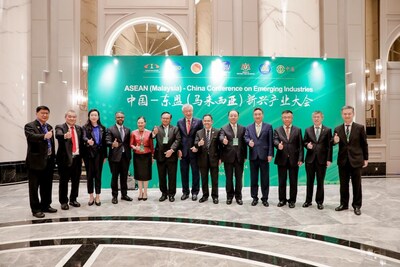
The opening ceremony featured speeches by Shi Zhongjun, secretary-general of ACC; Liu Dawei, vice president of CICG; Datuk Hanafi Sakri, deputy secretary-general of MITI; Ouyang Yujing, Ambassador of China to Malaysia; Soh Thian Lai, president of NCCIM; Low Kian Chuan, president of ACCCIM; and Ni Qingjiu, president of CECCM.
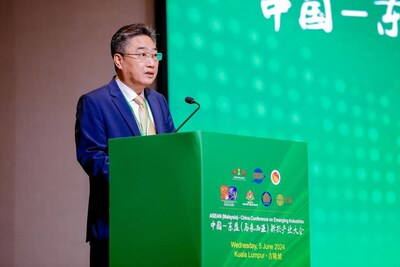
In his speech, Shi Zhongjun called ASEAN-China cooperation the most successful and vibrant model for cooperation in the Asia-Pacific region, which has played an irreplaceable role in promoting regional prosperity and modernization and lead the way for global post-COVID economic recovery characterized by world peace, stability and development. This year marks the 50th anniversary of the establishment of China-Malaysia diplomatic relations and the 11th anniversary of the China-Malaysia comprehensive strategic partnership. The bilateral relations have entered a track of fast development and moved towards comprehensive development and common prosperity. Currently, another scientific and technological revolution and industrial transformation are reshaping the global economic structure. Tapping the potential of emerging industries has become an important strategic choice for developing countries to achieve leapfrog socio-economic development. Against this backdrop, the ACC cooperated with its partners to host this conference. "Today, officials and representatives from government departments, chambers of commerce, and business communities from Malaysia, other ASEAN member states, and China have gathered here to explore new development goals and new key areas with an aim to lift ASEAN-China and Malaysia-China cooperation in emerging industries to a new level," he said.
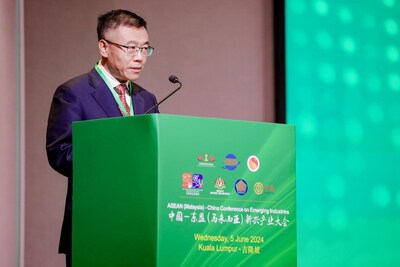
Liu Dawei remarked that economic and trade cooperation has become the ballast for the development of China-Malaysia relations. China is now advancing Chinese modernization on all fronts, which will provide more opportunities for countries around the world, including ASEAN member states. As an emerging economy in Asia, Malaysia's industrial structure is also transforming and upgrading, which will bring opportunities and benefits to the Chinese modernization drive. "Guided by new quality productive forces, this conference will actively explore cooperation in emerging industries such as new energy vehicles, new generation digital technology, and the creative cultural industry," he said. "Representatives from Chinese and Malaysian enterprises were invited to promote pragmatic synergy and produce tangible cooperation results." He stressed that fruitful results could be achieved through equality and win-win cooperation. To achieve that goal, he suggested working harder for broader consensus, engaging in more pragmatic cooperation in key areas, and establishing a regular exchange and cooperation mechanism.
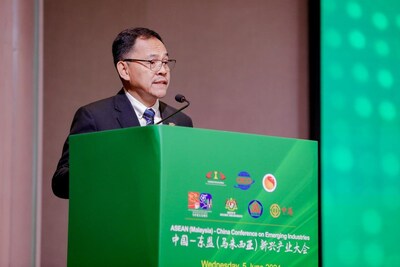
Hanafi Sakri expressed appreciation to the hosts for organizing the vibrant conference to bring representatives of government departments and business communities of the two countries together to discuss strategies to deepen cooperation and explore new opportunities in emerging industries. China is ASEAN's largest trading partner, and it has been Malaysia's largest trading partner for 15 consecutive years. Malaysia considers its friendly relations with China very important and supports China's investment initiatives and free trade agreements. It hopes to establish more comprehensive economic and trade relations with China while constantly innovating and creating more business opportunities. In the future, the digital economy and green energy will be the main areas of bilateral cooperation. Looking ahead, Malaysia is confident that implementation of various strategies and measures will elevate the friendly partnerships between Malaysia and China and ASEAN and China to a new level.
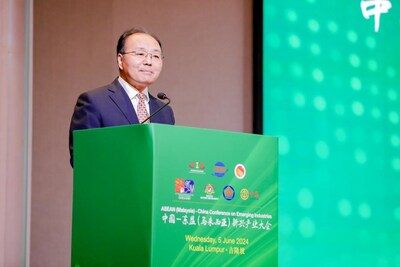
Ouyang Yujing highlighted the tremendous achievements in economic and industrial cooperation that China and Malaysia have made over the past 50 years. Looking ahead, the convergence of digital and green economies has presented unprecedented collaboration opportunities for both China and ASEAN member states, including Malaysia. Realizing the full potential of emerging industries requires consensus and collaboration to overcome barriers of trade sanctions, break shadows of protectionism, and seize opportunities for sustainable development and shared prosperity. "We are willing to work together with Malaysia and other ASEAN member states to uphold true multilateralism and bring more vitality and certainty to regional development," he said.
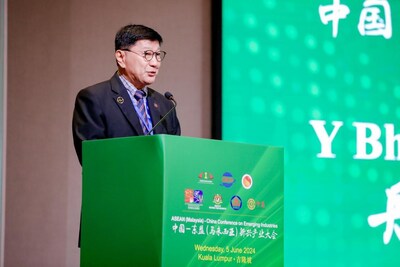
Soh Thian Lai reaffirmed NCCIM's commitment to enhancing economic connections between ASEAN and China, particularly through the promotion of emerging industries, which is not only important for future economic growth but also essential for sustainability. "This year, our focus is on transformative opportunities in the new energy vehicles (NEVs) sector, with an aim to attract direct investment from China into high-value industries," he said. "As we navigate the complexities of the global economic landscape, ASEAN-China collaboration in emerging industries remains a cornerstone of our strategic partnership."
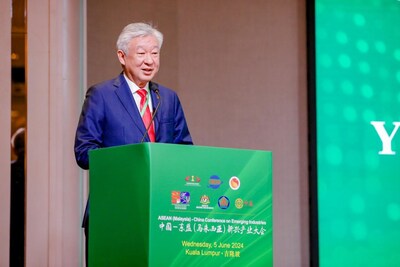
Low Kian Chuan commented on the Malaysian government's encouragement of development in various emerging industries. He cited a Chinese new energy vehicle company as an example to demonstrate how the company has taken full advantage of relevant preferential policies to establish a production base and a research center in Malaysia, which has met the demands of the Malaysian market and the ASEAN market at large. Malaysia has provided a broad development space and a favorable investment environment for Chinese emerging industries. Huge potential remains for the two countries to carry out more pragmatic cooperation to achieve more mutual benefits and win-win results.
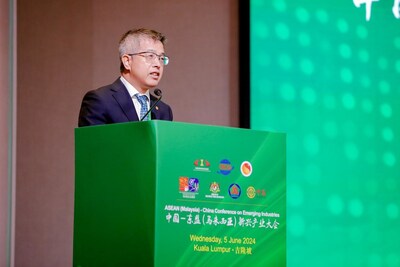
Ni Qingjiu shared his understanding of the important role Chinese enterprises are playing in Malaysia and commented on the role of CECCM in deepening trade and investment relations between the two countries. He recognized the conference as a good opportunity for all stakeholders to clarify the direction of joint efforts and a cooperation platform for the green and sustainable development of emerging industries. He pledged that his chamber of commerce would continue to serve as a bridge to promote China-Malaysia economic and trade cooperation and development.
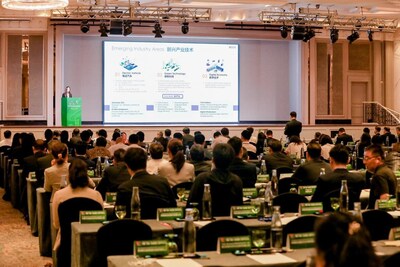
Several guests spoke at the session to promote trade and investment opportunities, including May Lim, senior deputy director of the Foreign Investment Division, Malaysian Investment Development Authority; Yang Yanyan, secretary-general of the China-ASEAN Business Council Joint Secretariat; Yang Yong, director of the Center for Promotion of Industrial Internet of Silk-Road; Leo Chen, executive vice president of the Chery Corporate Malaysia Sdn. Bhd; Yuan Hang, CEO of the CCIT Co., Ltd.; and Deng Liang, general manager of iQIYI Malaysia and Singapore.
Yang Yong talked about the "Kunpeng Program" he launched. The program aims to unite with emerging technology partners around the world to promote the sharing of advanced manufacturing and semiconductor technology and capability with Belt and Road partner countries and regions, the circulation of technology assets in relevant countries and regions, and common prosperity in science and technology.
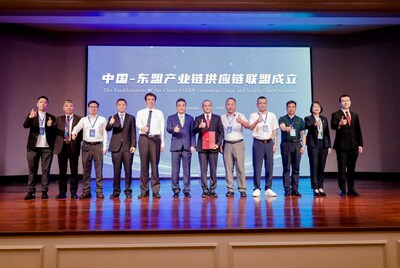
Subsequently, participating guests witnessed the establishment of the China-ASEAN Industrial Chain and Supply Chain Alliance and the China-ASEAN Cultural Community Alliance.
In the afternoon, three themed forums opened successively. At the "New Energy Vehicle" themed forum, participants focused on topics such as the path of China-ASEAN new energy vehicle cooperation, the low-carbon transformation process of new energy vehicles in Southeast Asia, coordinated development of the new energy vehicle industrial chain, and construction of the new energy vehicle ecosystem. At the "New Generation Information Technology" forum, participating representatives from the business community conducted a dialogue on advancing China-ASEAN cooperation with next generation information technology. At the "Creative Cultural Industry" forum, participants exchanged views on the potential of China-ASEAN cultural exchanges and cooperation, the application of new technologies such as artificial intelligence, augmented reality and blockchain in the cultural and entertainment industry, and the role of cultural products such as films and TV dramas in promoting the tourism industry.
After attending the opening ceremony and themed forums on June 5, participants embarked on a four-day journey to explore emerging industries in Malaysia to gain a better understanding of the country's business and investment environment and foster new growth in China-Malaysia economic and trade cooperation.
![]() View original content to download multimedia:https://www.prnewswire.com/apac/news-releases/eye-on-emerging-industries-302169314.html
View original content to download multimedia:https://www.prnewswire.com/apac/news-releases/eye-on-emerging-industries-302169314.html
SOURCE China Report ASEAN